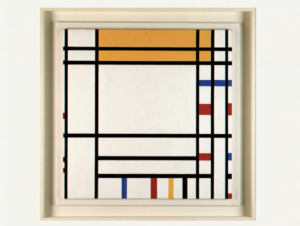Reflecting Eyeo2012 lecture by Casey Reas
Casey Reas starts with the statement that nature constituted the chaos in the world, but after, order was introduced by God. I was surprised by such an idea, because in my worldview people are the ones causing chaos in neatly ordered nature. Learning on biology classes about different systems that existed in nature, like nutrient cycling, I was thinking about humans intervening in these structures and causing disorder. But, now, looking back to Reas’ statement, I feel like maybe it is God and humanity who decided to order all the processes in our ecosystem, so that it would be easier for us to live with them. Moreover, I started thinking about how exactly artists are maintaining order with their works. Don’t they question the initial order of things to break through it? I felt like art was always about the protest, but now I do think I was partly wrong.
Looking at the artworks that experiment with total randomness in images, I really liked how the same patterns get transformed to different mediums and it adds to the idea of a chance and minimum control of future image (07:07 about process 18). In addition, I couldn’t fully understand what’s the optimum balance between total randomness and complete control, because some works used a little bit of randomness and mostly decision making, which gets us to the point that we can control the amount of randomness, and it is a contradictory statement at its core.
I really liked the author’s throwback to the past interactions of artists with a chance. It reflected in me in a sense that previous generations were highly afraid of chaos or anarchy, which is why destruction of an order in artworks was considered a radical gesture. But, as previous generations, we did experience different wars and uncertainties, and I think what makes us different from them and what makes artists be more confident and open about using randomness in arts, it is a sense of freedom and being okay with not knowing everything. Before I didn’t really think about historical events being influential on appealing to order and chaos, but now I do.
In the video, the quote of Richter: “Chance is always planned, but also very surprising” resonated with me because chance is needed to introduce something different and disruptive.
Observing Mondrian’s work, I didn’t expect to understand that order actually does not limit emotion and spirit, even in total order there is a room for interpretation and imagination. Moreover, looking at different algorithms presented by Reas, an association with the game PacMan came to my mind, since it also employed balance between order and randomness.

